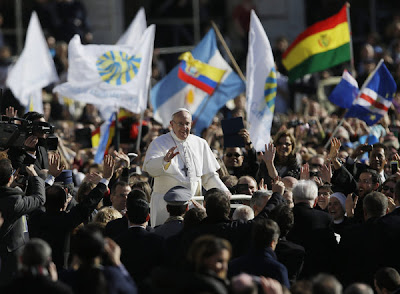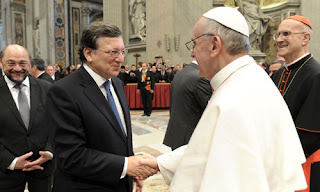VATICAN CITY — Striking a tone of radical humility that has already become his trademark, Pope Francis offered a passionate pledge in his installation Mass on Tuesday to serve “the poorest, the weakest, the least important,” urging world leaders to protect human life and the environment and use tenderness to inspire hope.
Seated on a throne under a canopy in front of St. Peter’s Basilica before several hundred thousand faithful and the cardinals of his church, Francis implored dozens of visiting world leaders not to allow “omens of destruction and death to accompany the advance of this world.”
“Today, too, amid so much darkness, we need to see the light of hope and to be men and women who bring hope to others,” the pope added, speaking before heads of state from his native Argentina to Zimbabwe, including Vice President Joseph R. Biden Jr. and the German chancellor, Angela Merkel.
“Please,” he said to them, adopting a direct tone and offering a clear signal of his own ambitions for his papacy, “I would like to ask all those who have positions of responsibility in economic, political and social life, and all men and women of good will: let us be protectors of creation, protectors of God’s plan inscribed in nature, protectors of one another and of the environment.”
One week into the job, Francis has already put his stamp on the papacy.
Before the installation Mass, Francis toured St. Peter’s Square in a white, open-air vehicle, stopping to kiss several babies, comfort a paraplegic and shake hands with the cheering faithful, who took out smartphones and other devices to snap photographs. At one point, he gave supporters a thumbs-up sign, drawing laughter.
Security officers flanked his vehicle, and a strong contingent of Italian police officers mingled with the crowds.
The son of Italian immigrants to Argentina, Francis is the first pope from Latin America. Before the installation Mass, he called his native country, and his voice was broadcast in the Plaza de Mayo in Buenos Aires, to the delight of the crowds that had maintained an all-night vigil awaiting the Mass from the man they had known as Cardinal Jorge Mario Bergoglio.
Francis is also the first Jesuit pope; the order is based on service, and its members have traditionally shunned climbing the church hierarchy. In his homily, Francis quoted Scripture to say that as bishop of Rome, he was endowed with “a certain power.” But he added, “Let us never forget that authentic power is service.”
“He must be inspired by the lowly, concrete and faithful service which marked St. Joseph,” Francis said during the Mass, which fell on the Feast of St. Joseph. “He must open his arms to protect all of God’s people and embrace with tender affection the whole of humanity, especially the poorest, the weakest, the least important, those whom Matthew lists in the final judgment on love: the hungry, the thirsty, the stranger, the naked, the sick and those in prison.”
Francis’ reference to St. Joseph could also be interpreted as a signal to Benedict XVI, the pope emeritus and former Cardinal Joseph Ratzinger, whose decision to step down last month shook the Catholic world. On Tuesday, Francis sent his predecessor a warm greeting “full of affection and gratitude,” drawing long applause from the crowd. The Vatican said Tuesday that Francis had also called Benedict to wish him a happy name day, and offered “his and the church’s thanks for his service.” It called the conversation “broad and cordial.”
The Vatican statement said that “Benedict followed the events of these days with intense participation,” including the installation Mass, “and assures his successor his continued closeness in prayer.”
About 150,000 to 200,000 people attended the Mass, the Vatican said. As it began, Francis received two symbolic emblems of his role as leader of the world’s 1.2 billion Roman Catholics: the fisherman’s ring, which recalls how St. Peter fished for food and later for souls, and the pallium, a white woolen vestment decorated with red crosses that symbolizes the role of the pope as a good shepherd.
“Let us not forget that hatred, envy and pride defile our lives,” Francis said in his homily. “We must not be afraid of goodness or even tenderness,” he added.
His words resonated with Andreina Baldi, 58, a housewife from Rome who attended the Mass. “This is why we are all here, his warmth,” she said. “He just said that we should all open our arms to welcome God’s people, anybody, the poor, the youngest, those in jail. And he is already doing so.”
Anna Di Renzo, an artist from the northern Italian village of Portacomaro, the ancestral home of Francis’ family, said, “In just a few days, he has conquered our hearts.”
The Vatican said that representatives of 132 countries and international organizations were to attend the Mass. They included Robert Mugabe, the autocratic president of Zimbabwe. He is the subject of a travel ban by European countries because of Zimbabwe’s human rights record. The Vatican has said that it does not issue invitations but welcomes leaders who come.
In St. Peter’s Square, Brother Gregory Lucrezia of the Franciscan Friars of the Atonement, originally of Garrison, N.Y., said he hoped that under Francis, the Catholic Church would return to a mission of service. “I don’t think he’ll solve everyone’s problems, because they are many and deep, but his prayerful attitude and ability to unite everyone” should go a long way, he said.
Source: http://www.nytimes.com/2013/03/20/world/europe/installation-of-pope-francis.html?_r=0
Seated on a throne under a canopy in front of St. Peter’s Basilica before several hundred thousand faithful and the cardinals of his church, Francis implored dozens of visiting world leaders not to allow “omens of destruction and death to accompany the advance of this world.”
“Today, too, amid so much darkness, we need to see the light of hope and to be men and women who bring hope to others,” the pope added, speaking before heads of state from his native Argentina to Zimbabwe, including Vice President Joseph R. Biden Jr. and the German chancellor, Angela Merkel.
“Please,” he said to them, adopting a direct tone and offering a clear signal of his own ambitions for his papacy, “I would like to ask all those who have positions of responsibility in economic, political and social life, and all men and women of good will: let us be protectors of creation, protectors of God’s plan inscribed in nature, protectors of one another and of the environment.”
One week into the job, Francis has already put his stamp on the papacy.
 |
| Representatives of 132 nations and world organizations attended Pope Francis’s inauguration Mass. |
Before the installation Mass, Francis toured St. Peter’s Square in a white, open-air vehicle, stopping to kiss several babies, comfort a paraplegic and shake hands with the cheering faithful, who took out smartphones and other devices to snap photographs. At one point, he gave supporters a thumbs-up sign, drawing laughter.
Security officers flanked his vehicle, and a strong contingent of Italian police officers mingled with the crowds.
The son of Italian immigrants to Argentina, Francis is the first pope from Latin America. Before the installation Mass, he called his native country, and his voice was broadcast in the Plaza de Mayo in Buenos Aires, to the delight of the crowds that had maintained an all-night vigil awaiting the Mass from the man they had known as Cardinal Jorge Mario Bergoglio.
Francis is also the first Jesuit pope; the order is based on service, and its members have traditionally shunned climbing the church hierarchy. In his homily, Francis quoted Scripture to say that as bishop of Rome, he was endowed with “a certain power.” But he added, “Let us never forget that authentic power is service.”
“He must be inspired by the lowly, concrete and faithful service which marked St. Joseph,” Francis said during the Mass, which fell on the Feast of St. Joseph. “He must open his arms to protect all of God’s people and embrace with tender affection the whole of humanity, especially the poorest, the weakest, the least important, those whom Matthew lists in the final judgment on love: the hungry, the thirsty, the stranger, the naked, the sick and those in prison.”
Francis’ reference to St. Joseph could also be interpreted as a signal to Benedict XVI, the pope emeritus and former Cardinal Joseph Ratzinger, whose decision to step down last month shook the Catholic world. On Tuesday, Francis sent his predecessor a warm greeting “full of affection and gratitude,” drawing long applause from the crowd. The Vatican said Tuesday that Francis had also called Benedict to wish him a happy name day, and offered “his and the church’s thanks for his service.” It called the conversation “broad and cordial.”
The Vatican statement said that “Benedict followed the events of these days with intense participation,” including the installation Mass, “and assures his successor his continued closeness in prayer.”
About 150,000 to 200,000 people attended the Mass, the Vatican said. As it began, Francis received two symbolic emblems of his role as leader of the world’s 1.2 billion Roman Catholics: the fisherman’s ring, which recalls how St. Peter fished for food and later for souls, and the pallium, a white woolen vestment decorated with red crosses that symbolizes the role of the pope as a good shepherd.
“Let us not forget that hatred, envy and pride defile our lives,” Francis said in his homily. “We must not be afraid of goodness or even tenderness,” he added.
 |
| Pope Francis shakes hands with José Manuel Barroso, president of the European Commission. Photograph: L'Osservatore Romano/Getty Images |
Anna Di Renzo, an artist from the northern Italian village of Portacomaro, the ancestral home of Francis’ family, said, “In just a few days, he has conquered our hearts.”
The Vatican said that representatives of 132 countries and international organizations were to attend the Mass. They included Robert Mugabe, the autocratic president of Zimbabwe. He is the subject of a travel ban by European countries because of Zimbabwe’s human rights record. The Vatican has said that it does not issue invitations but welcomes leaders who come.
In St. Peter’s Square, Brother Gregory Lucrezia of the Franciscan Friars of the Atonement, originally of Garrison, N.Y., said he hoped that under Francis, the Catholic Church would return to a mission of service. “I don’t think he’ll solve everyone’s problems, because they are many and deep, but his prayerful attitude and ability to unite everyone” should go a long way, he said.
Source: http://www.nytimes.com/2013/03/20/world/europe/installation-of-pope-francis.html?_r=0
Comments
Post a Comment